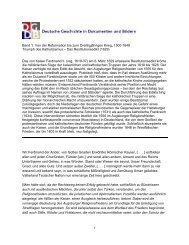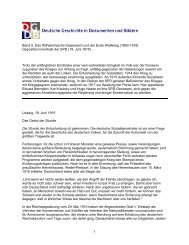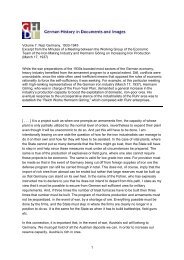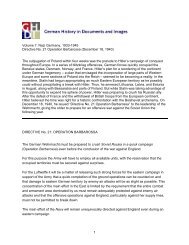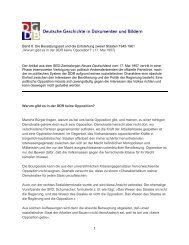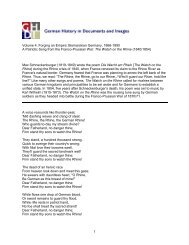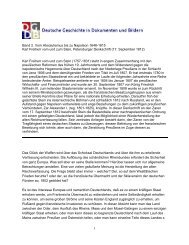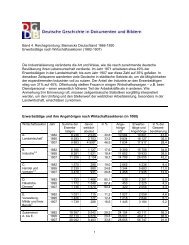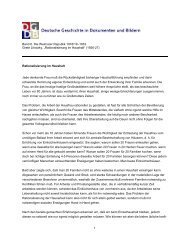1 Volume 5. Wilhelmine Germany and the First World War, 1890 ...
1 Volume 5. Wilhelmine Germany and the First World War, 1890 ...
1 Volume 5. Wilhelmine Germany and the First World War, 1890 ...
You also want an ePaper? Increase the reach of your titles
YUMPU automatically turns print PDFs into web optimized ePapers that Google loves.
<strong>Volume</strong> <strong>5.</strong> <strong>Wilhelmine</strong> <strong>Germany</strong> <strong>and</strong> <strong>the</strong> <strong>First</strong> <strong>World</strong> <strong>War</strong>, <strong>1890</strong>-1918<br />
The September Memor<strong>and</strong>um (September 9, 1914)<br />
Bethmann Hollweg (1856-1921) managed <strong>the</strong> precarious domestic consensus on <strong>the</strong> war<br />
through <strong>the</strong> art of evasion. He parried entreaties from proponents of conflicting positions <strong>and</strong><br />
vaguely sought to assure those in favor of a moderate peace <strong>and</strong> constitutional reform of his<br />
support. He sympathized in private with <strong>the</strong> idea of large-scale annexations, but public<br />
statements to this effect were impossible. This memor<strong>and</strong>um, which advocated breathtaking<br />
annexations, originated in <strong>the</strong> Chancellor's own office in <strong>the</strong> summer of 1914. Historians have<br />
used it as evidence that Bethmann Hollweg planned <strong>the</strong> war to achieve German hegemony in<br />
Europe.<br />
Berlin, September 9, 1914<br />
1. France. The military authorities are to judge whe<strong>the</strong>r <strong>the</strong> annexation of Belfort, <strong>the</strong> western<br />
slopes of <strong>the</strong> Vosges, <strong>the</strong> demolition of <strong>the</strong> fortresses, <strong>and</strong> <strong>the</strong> annexation of <strong>the</strong> coastline from<br />
Dunkirk to Boulogne is to be dem<strong>and</strong>ed.<br />
In all events, because it is necessary for our industry’s iron-ore production, <strong>the</strong> basin of Briey is<br />
to be annexed.<br />
Fur<strong>the</strong>rmore, a war indemnity, to be paid in installments. It is to be so high that France will be<br />
unable in <strong>the</strong> next 18 to 20 years to expend major sums on armaments.<br />
In addition: a commercial treaty that makes France economically dependent on <strong>Germany</strong>,<br />
transforms it into our export market, <strong>and</strong> enables it to exclude English commerce from France.<br />
This commercial treaty must secure financial <strong>and</strong> industrial freedom of movement for us in<br />
France – so German firms can no longer be treated differently from French firms.<br />
2. Belgium. Incorporation of Liege <strong>and</strong> Verviers into Prussia, a border strip of <strong>the</strong> Belgian<br />
province of Luxembourg to <strong>the</strong> Kingdom Luxembourg.<br />
It remains questionable whe<strong>the</strong>r Antwerp, along with an access route to Liege, is also to be<br />
annexed.<br />
Whatever <strong>the</strong> case, Belgium must in all events – even should it continue to exist as a state –<br />
sink to <strong>the</strong> status of a vassal state; it must cede occupation rights in militarily significant ports;<br />
place its coasts at our disposal; become economically a German province. Given such a<br />
solution, which has <strong>the</strong> advantages of annexation without <strong>the</strong> domestic political disadvantages,<br />
Fr[ench] Fl<strong>and</strong>ers, along with Dunkirk, Calais, <strong>and</strong> Boulogne, with <strong>the</strong>ir largely Flemish<br />
1
population, can be h<strong>and</strong>ed over, as is, to Belgium without any danger. The competent agencies<br />
will have to evaluate <strong>the</strong> military value of this position vis-à-vis Engl<strong>and</strong>.<br />
3. Luxembourg. Will become a German federal state <strong>and</strong> will receive a strip from <strong>the</strong> present<br />
Belgian province of Luxembourg <strong>and</strong> possibly <strong>the</strong> corner of Longwy.<br />
4. A central European economic association is to be constructed through common customs<br />
agreements, to comprise France, Belgium, Holl<strong>and</strong>, Denmark, Austria-Hungary, Pol<strong>and</strong> (!) <strong>and</strong><br />
possibly Italy, Sweden, <strong>and</strong> Norway. This association will probably have no common<br />
constitutional head <strong>and</strong> will provide for ostensible equality among its members, although it will in<br />
fact be under German leadership; it must stabilize <strong>Germany</strong>’s economic predominance in<br />
central Europe.<br />
<strong>5.</strong> The question of colonial acquisitions, above all <strong>the</strong> creation of a contiguous central African<br />
colonial empire, will be considered later; so will <strong>the</strong> question of German goals vis-à-vis Russia.<br />
As <strong>the</strong> foundation for economic arrangements with France <strong>and</strong> Belgium, a short, provisional<br />
formula for a possible preliminary peace is to be found.<br />
6. Holl<strong>and</strong>. Means <strong>and</strong> measures should be considered by which Holl<strong>and</strong> can be brought into<br />
closer association with <strong>the</strong> German Empire.<br />
In view of <strong>the</strong> Dutch character, this closer association must be free of any sense of coercion; it<br />
must not alter <strong>the</strong> Dutch way of life, nor change Dutch military obligations. It will thus leave<br />
Holl<strong>and</strong> ostensibly independent but in fact dependent upon us. Perhaps an alliance that extends<br />
to <strong>the</strong> colonies, in any case a close customs union, possibly <strong>the</strong> incorporation of Antwerp into<br />
Holl<strong>and</strong> might be considered, in return for <strong>the</strong>ir granting <strong>Germany</strong> <strong>the</strong> right to keep troops in <strong>the</strong><br />
fortress of Antwerp as well as at <strong>the</strong> mouth of <strong>the</strong> Schelde.<br />
Source: Bethmann Hollweg Denkschrift [Memor<strong>and</strong>um by Bethmann Hollweg], September 9,<br />
1914, Bundesarchiv-Lichterfelde, Reichskanzlei, Grosses Hauptquartier 21, No. 2476.<br />
Reprinted in Wolfdieter Bihl, Deutsche Quellen zur Geschichte des Ersten Weltkrieges [German<br />
Sources on <strong>the</strong> History of <strong>the</strong> <strong>First</strong> <strong>World</strong> <strong>War</strong>]. Darmstadt: Wissenschaftliche Buchgesellschaft,<br />
1991, pp. 61-62.<br />
Translation: Jeffrey Verhey <strong>and</strong> Roger Chickering<br />
2



